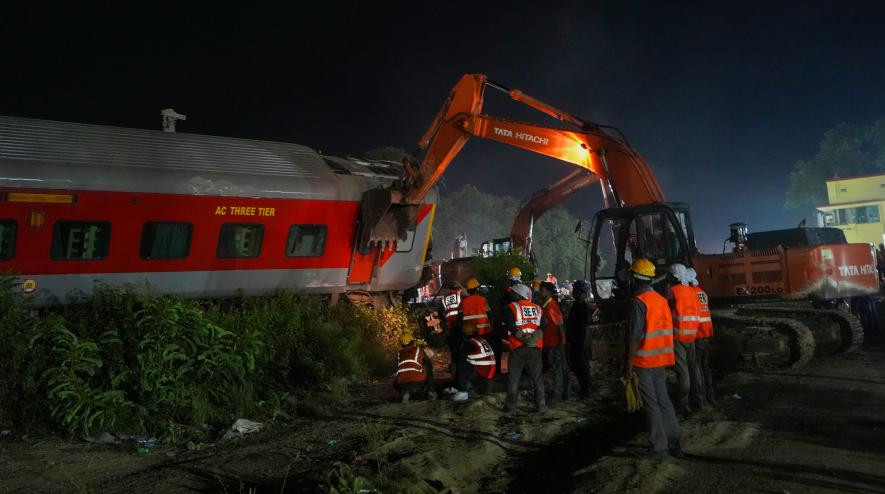Odisha Rail Mishap: Former Bureaucrat Sarma Writes to Rail Minister, Calls out Hasty CBI Probe

Rescue team members during a search operation after the accident involving three trains that claimed at least 261 people and left over 900 injured, in Balasore district, Odisha, Saturday, June 3, 2023. Image Courtesy: PTI Photo/Swapan Mahapatra
New Delhi: Former secretary to the Government of India, EAS Sarma, has written a letter to Union Railway Minister Ashwini Vaishnaw regarding the Odisha rail accident. In the letter, Sarma called out the hasty announcement of a CBI probe at a time when the railway safety regulator was yet to complete investigation into the technical aspects of the accident.
The letter by the 1965 IAS officer of the Andhra Pradesh cadre, further highlighted how the Railways should shift its attention from providing a vast social security cover for millions of passengers at affordable charges. This is particularly pertinent when the Union government is hell-bent on promoting the new Vande Bharat trains, accessible to only a handful of people in the country due to their expensive fares.
Moreover, the Railways' shift of focus towards speed from safety has also meant that a degree of negligence has cropped up. He called upon the Railway Ministry to provide accident-free railway travel, and shift its focus from speed to safety.
Full text of letter below:
********************************
Shri Ashwini Vaishnaw
Railway Minister
Dear Shri Vaishnaw,
The latest railway accident in Odisha, which has resulted in the death of more than 280 passengers and hundreds injured, is unfortunate.
I feel somewhat surprised that the Railways should hastily announce a probe by the CBI, suggesting the possibility of sabotage, without the railway safety regulator having an opportunity to look into the technical aspects of the accident. To me, it appears to be a move to mislead the public about the larger issues of failure in governance at the level of the Ministry of Railways.
In this connection, I refer to a news report which indicates that the Coromandel Express involved in the accident was running at 129km/ hour speed and, as a result of a failure in the Block Proving By Axle Counter (BPAC) electronic locking system, the train got misdirected to a line which was already occupied, leading to the collision. Whether this was the root cause or not is a matter that needs to be subject to a technical investigation by the Commissioner for Rail Safety. Once the technical cause is established, the next question to be investigated is whether it occurred due to a faulty BPAC system or manual interference by someone to manipulate it deliberately. Instead of going through these well-defined steps of enquiry, bringing in the CBI straight away on an imagined suspicion of sabotage would only obfuscate the real technical issues involved.
The same news report also mentions that “the BPAC equipment is supplied by private vendors after being cleared by the Research Designs and Standards Organisation (RDSO)……Industry sources told THE WEEK that on many occasions, the BPAC comes fitted with substandard quality fitments that escape RDSO scrutiny resulting in the malfunctioning of the equipment“. This is a serious matter, calling for a technical audit of the BPAC inputs supplied by private companies to RDSO and a close scrutiny of the quality certification systems within the RDSO.
Had the Railways adopted one of the most important recommendations of the Kakodkar Committee on Rail Safety (2012), that is, to constitute an independent statutory railway safety authority, such an authority would have exercised stringent oversight on all such matters concerning the safety of trains, including what preparatory measures that the Indian Railways ought to take before introducing super-fast trains such as bullet trains and Vande Bharats. Unfortunately, the Ministry of Railways is still dragging its feet on this, even though it has displayed no hesitation whatsoever in inaugurating at least 14 Vande Bharats already and is about to launch scores more, while accidents meanwhile continue to occur without respite on several routes.
In this connection, I have come across a disturbing communication dated February 9, 2023, from PCOM, South Western Railway (it is available in the public domain) on the failure of the BPAC system at the Hosadurga Road station of Birur-Chikjajur section of Mysore division on February 2, 2023, involving Sampark Kranti Express, leading to an “averted head-on collision” with a goods train. This was an alert that should have woken up the eyes of the Railway Board to the possibility of the BPAC system failing at times. What action did the Railway Board take on such an important alert? Had the Board acted on it on time, subsequent accidents could perhaps have been avoided, especially when more and more super-fast trains are hurling across the length and the breadth of the country.
This brings one to the larger issues of governance in the Railways.
-
Has the Railway Board carried out any analysis on the adverse impact of super-fast Vande Bharats will have on the average speed of other trains on which lakhs of short-distance passengers who cannot afford to pay heavy charges depend?
-
Considering that the Railways have not invested sufficiently in upgrading the ageing tracks and increasing their carrying capacity, along with auxiliary safety systems such as upgradation of the signalling systems etc., has the Board determined the upper limits of the speed at which trains can be allowed to run in each section?
-
While Vande Bharats may serve the interests of the more affluent sections of passengers who form only a small proportion of the passenger traffic, does not the Ministry of Railways consider it equally necessary to improve facilities for the much larger sections of passengers belonging to low-income groups? There have been complaints from such passengers that Vande Bharats have slowed down their trains! In fact, in the Odisha accident, unreserved bogies jam-packed with passengers were the ones that got badly affected, with many fatalities.
-
Considering that there was already one serious instance of failure of the BPAC system on 8-2-2023 in the South West Railways, and one more now in Odisha, causing a large number of fatalities and injuries and the consequent human trauma, would the Railway Board continue to run super-fast trains, knowing well that there is a possibility of more such BPAC failures occurring? Will the Railway Board continue to launch more and more speeding Vande Bharats, instead of ascertaining the speed-worthiness of the tracks and the efficacy of the BPAC systems?
To provide accident-free railway travel, the Ministry of Railways should shift its focus from speed to safety. While speed may fulfil the needs of a few passengers, the safety, convenience and comfort of the majority cannot be compromised.
The Ministry of Railways should take note of the fact that Indian Railways primarily provide a vast social security cover for millions of passengers at affordable charges. The Railways should not shift its focus from playing that role.
Regards,
Yours sincerely,
E A S Sarma
Former Secretary to the Government of India
Visakhapatnam
Get the latest reports & analysis with people's perspective on Protests, movements & deep analytical videos, discussions of the current affairs in your Telegram app. Subscribe to NewsClick's Telegram channel & get Real-Time updates on stories, as they get published on our website.
























